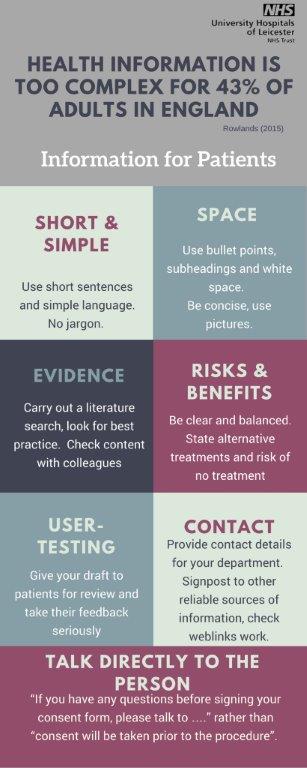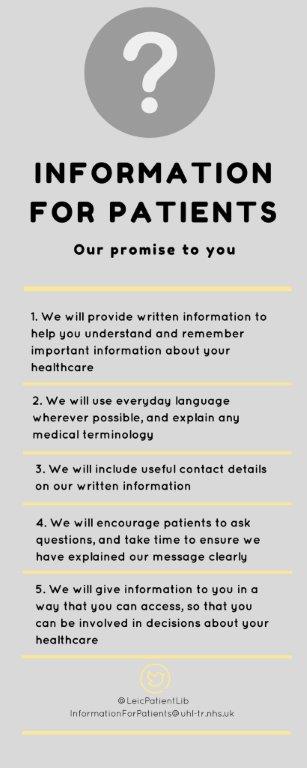Pip Divall is Clinical Librarian Service Manager at University Hospitals of Leicester (UHL) NHS Trust, and the Health representative for the Information Literacy Group. Hannah Beckitt is the Patient Information Librarian at UHL NHS Trust, a relatively new role which we have established in order to allow patients better access to information about their health, and their interactions with the hospital.

Health Literacy is not a new concept, however it has gained momentum in Health Libraries in recent years and NHS Health Education England (HEE) are keen to raise awareness of health literacy for the general public, and for NHS staff.
Health literacy is about people having the knowledge, skills, understanding and confidence they need to be able to use healthcare information and services. However, there is also a role to play for organisations in terms of removing barriers and enabling people to make informed choices about their own healthcare. There are environmental, political, cultural and societal factors that determine the impact of low health literacy; the Health Literacy Centre Europe estimate that this could cost the NHS 3-5% of its budget.
It isn’t just about people receiving health information in a format that is accessible to them, although this is a fundamental aspect that we are often still working on. It also includes the ability to critically appraise the many sources of information that are available to us; to be able to navigate through complex health systems; to have the confidence to ask questions and challenge when needed; and to be a partner in your own healthcare decisions.
NHS Scotland have been at the forefront of putting Health Literacy policy into practice with their: strategy “Making it Easier – a health literacy action plan for Scotland 2017-2025” which sets out the ambition for Scotland to be a health-literate society.

At UHL NHS Trust, we are launching Health Literacy staff training and have introduced health literacy principles into our policy for creating information for patients. The leaflets that we currently give to patients are generally full of medical jargon, and it is clear that we have a long way to go in order to support staff to be health literacy aware. In fact there is a need for organisational culture change across our Trust and the wider NHS to remove barriers and empower people to understand and take an active part in their own healthcare.

Some examples of the benefits of getting this right include:
- Patients understand how to self-manage their conditions
- Patients access the most appropriate service e.g. pharmacy instead of GP/ walk-in centre
- Patient experience is enhanced because patients have realistic expectations about what their treatment will/ will not be
- Patients fully understand and accept the risks associated with a procedure before signing a consent form.
- Patients can evaluate sources of health information and discount unreliable health information
- Patients have a voice to question and challenge as appropriate; we don’t always get it right and one size doesn’t fit all
- Patients can have a dialogue with clinicians on an equal footing, facilitating shared decision-making using a common language rather than medical jargon.

HealthHealth Information Week 2018
Health Information Week takes place this year from Monday 2nd July to Sunday 8th July. HIW2018 is a multi-sector collaboration between NHS libraries, public libraries and other information provision services aimed at promoting good quality, reliable health resources that are available to the public, and also to health sector staff interacting with them.
Each day of this week is focussed on a different theme, with information providers encouraged to follow these if possible, although you will find a number of different resources being promoted alongside these.
Monday 2nd July – Healthy lifestyles
Tuesday 3rd July – Mental health
Wednesday 4th July – Health and digital literacy
Thursday 5th July- Long term conditions
Friday 6th July – Mindfulness and relaxation
Saturday 7th July – Patient stories
Sunday 8th July – Promoting partnerships in health information
Further information
More information on Health Information Week, including links to poster templates and further ideas.
Follow on Twitter @Healthinfoweek or use the hashtag #HIW2018
Browse HEE’s suggested list of useful health information resources grouped by theme
If you or your organisation take part in any of the scheduled events for HIW2018, the Project Team are keen to hear about your feedback and/or case studies at healthinfoweek@gmail.com

